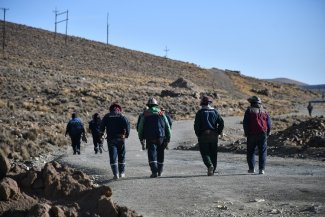3 February 2017: a young boy takes part in demonstrations against the five recent deaths of refugees at camps in Greece. Graffiti, signs and clothes representing the dead are displayed in front of the offices of the Ministry of Migration in Athens, Greece.
In the Moria refugee camp on the Greek island of Lesbos three refugees died in just one week in January. On 3 February demonstrations were held against these deaths as well as two more – an Iraqi man on the island of Samos and a Syrian baby on the mainland.
According to the United Nations High Commissioner for Refugees (UNHCR) some 62,000 refugees are currently trapped in freezing conditions in Greece as a result of Europe’s closed borders.
This shouldn’t be the case. In September 2015, the European Union promised to relocate the more than 66,000 refugees stranded in Greece to other EU countries. But now, just over a year later, only about 20 per cent have been offered relocation, while just over 10 per cent have actually left Greece.
A deal between the EU and Turkey has created a ‘fast track’ procedure which allows for the return of refugees and migrants to Turkey. On the Greek islands – which serve as a landing point in Greece for those escaping conflict from countries such as Syria, Afghanistan and Iraq – refugees are held in very poor detention facilities and are not transferred to the mainland. As a result, camps on the islands are overflowing: as many as 13,000 people are surviving in camps built with a capacity for 9,000.
Refugees in Greece are enduring an unusually, bitterly cold winter. Shocking images of refugees seeking shelter under tents have appeared all over the international media. UNHCR has responded with some 19,000 places in flats, hotels and other lodgings for the vulnerable and those awaiting relocation.
From “We can do it,” to closed borders
The situation couldn’t have looked more different in 2015. An escalating number of refugees were dying while attempting to reach mainland Europe. The drowning of three-year-old Alan Kurdi drew a strong public response.
In August 2015 the German Chancellor Angela Merkel first said, “We can do it,” as she welcomed tens of thousands of Syrian refugees to Germany. But by March 2016, a backlash against refugees had closed Europe’s borders.
The police and the military evicted trapped refugees at the Macedonian/Greek border at the end of May, who were then transferred to hastily created camps, often in warehouses, while those who managed to avoid the camps took their chances with smugglers.
Meanwhile, Europe’s pledge to take in refugees from Greece to ‘share the burden’ has fallen short. As of 13 February 8,874 refugees had been ‘relocated’ from Greece to richer countries in northern Europe.
In addition, relocation is not available for all nationalities. Amongst those ineligible are Iraqis and Afghans, because only those nationalities who have more than 75 per cent success rate in their asylum applications in Europe are eligible. The process is slow. There are even some Syrians whose applications have been refused – with no reasons given and no possibility of appeal.
Ali (not his real name) is in Greece with a nephew, his wife and their five young children. They are all Syrians. He requested relocation for himself and his family in March 2016, just before the borders shut. He had an interview with a European embassy in April 2016 and his application was refused.
They have been given a three-year ‘refugee card’ which permits them to stay in Greece. Ali’s housing has been provided by the NGO Praxis but he worries about the future. “We have been in this flat for one month. If they say we have to go from the house, where will we go? What are we going to do in the street?” He speaks no Greek and is acutely aware of the lack of work in Greece.
Even for those who are not refused, the wait is long and painful.
Mohamed (not his real name) is a Syrian Kurd with four sons. Three are already in Germany and one stays with him and his wife in Greece. He is waiting desperately to be reunited with his sons. “After we came here, it took two months to apply for Germany…one month later came the appointment. For six months we have been waiting for the call [to say our application has been accepted]. I wait every day with the telephone beside me.”
“Either they integrate them or they integrate them”
Those people who are refused may eventually get refugee status in Greece. But Greece is still suffering from the devastating effects of EU-imposed austerity measures and a large public deficit. As a result, there are very few opportunities for refugees to make a living in the country.
Roland Schoenbauer, the UNHCR spokesperson in Greece told Equal Times: “In 2015, parts of Europe were just waving anybody through. Since early 2016 it’s the opposite. [The EU] is rejecting anybody, or as many people as possible.”
As far as he is concerned, Europe has no real option when it comes to dealing with the refugees stranded in Greece.
“Either they integrate them or they integrate them. Most of them will have to stay [in Europe],” he said, adding that international law “will not allow them to be returned [to their home countries] based on the European Convention on Human Rights. So if they have to stay, why not let them stay formally straight away?”
Ignoring the problem or hoping that Greece will solve it by itself is not the solution, he says. “If Europe believes that this will go away, it won’t. Where should these people go? They cannot go to the moon. They cannot go back. So they have to go somewhere.
’’And if Europe believes that Greece is going to integrate 50,000 people in the middle of an economic crisis just like that…,” Schoenbauer pauses. “I think they might want to reflect again.”











